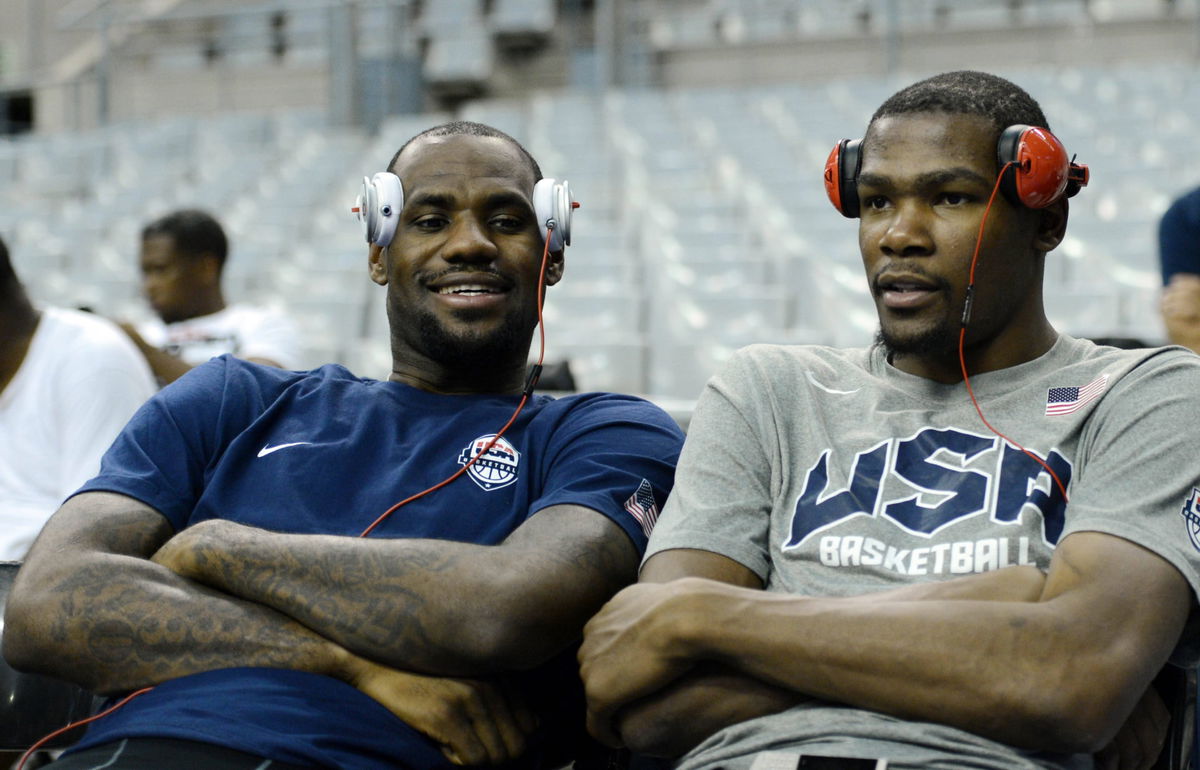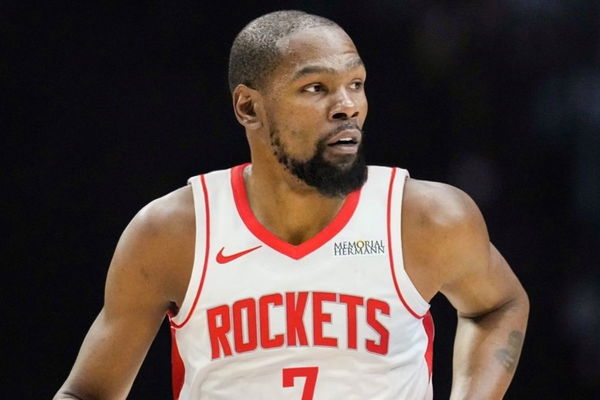
Imago
BASKETBALL: USA Team Training July 23, 2012 Barcelona, SPAIN USA players LeBron James left and Kevin Durant right sit on the bench after practice in preparation for the 2012 London Olympic Games, Olympische Spiele, Olympia, OS at Palau Sant Jordi. Barcelona Spain UNITED STATES, EDITORIAL USE ONLY PUBLICATIONxINxGERxSUIxAUTxONLY Copyright: xJerryxLai-USAxTODAYxSportsx 6396570

Imago
BASKETBALL: USA Team Training July 23, 2012 Barcelona, SPAIN USA players LeBron James left and Kevin Durant right sit on the bench after practice in preparation for the 2012 London Olympic Games, Olympische Spiele, Olympia, OS at Palau Sant Jordi. Barcelona Spain UNITED STATES, EDITORIAL USE ONLY PUBLICATIONxINxGERxSUIxAUTxONLY Copyright: xJerryxLai-USAxTODAYxSportsx 6396570
With the Kevin Durant sweepstakes running all summer, Miami kept showing up near the front of the list but never closed the deal, and that chatter grew louder as teams sized up how much the Suns wanted in return. Reports flagged Miami as a viable suitor while also noting the Heat were reluctant to include cornerstone pieces in any package, which limited their flexibility and made any KD move to South Beach complicated. This was despite the fact that KD himself shortlisted the Heat alongside the Rockets and the San Antonio Spurs as his three preferred destinations.
Watch What’s Trending Now!
And while the move not materializing has been attributed to Miami’s refusal to include high-value pieces such as young stars Kel’el Ware and Nikola Jovic, a former Miami Heat player believes LeBron James himself played a part. In what way, you may ask? Well, Chalmers, who played a huge role in the Heat’s 2012 championship run, most remembered for his three-pointer in the Game 4 of the NBA Finals, believes the reason was potential comparisons with LeBron’s legacy at the Heat.
ADVERTISEMENT
NBA Central surfaced a sneak from his interview on X, and put Chalmers’s take front and center for the wider feed. “I’ve been saying it for years. I don’t think KD ever goes to the Heat just because of the LeBron legacy. He’s gotta win two or more championships before he goes to the Heat so, I don’t think that pressures warranted at this age or at this time so I’d never thought that he’d go to Heat”. That is the claim in plain terms: Chalmers says Durant preferred not to inherit the specific pressure of trying to fill a lane LeBron once defined in Miami.
Mario Chalmers says Kevin Durant didn’t want the pressure of following in LeBron’s footsteps with the Heat
“I’ve been saying it for years. I don’t think KD ever goes to the Heat just because of the LeBron legacy. He’s gotta win two or more championships before he goes to the… pic.twitter.com/bP8IDzBpDV
— NBACentral (@TheDunkCentral) September 15, 2025
ADVERTISEMENT
James won the first two of his four championship with the Heat back-to-back in 2012 and 13. He was utterly dominant through those runs, selected as the NBA MVP and the Finals MVP in both seasons. According to Chalmers, Durant, who is well aware that he is often compared to James, would have been tasked with helping the Heat land their first championship since the LeBron days, something the potential roster featuring KD and the wealth of talent Miami already has may have been deemed fit to pull off, at least on paper.
However, with KD already 36 and heading towards the twilight of his career, Chalmers simply believes he wanted a destination that did not come with such comparisons, and more notably, where he had no glaring legacy to compare to.
ADVERTISEMENT
Put that next to what teams were actually offering and the picture becomes clearer. Reporting from league insiders shows Miami did explore serious trade routes but repeatedly balked at surrendering their young stars, let alone the likes of Bam Adebayo or Tyler Herro, all of whom were deemed off-limits. According to Miami Herald, they instead offered Andrew Wiggins, Terry Rozier, Jaime Jacquez Jr., Haywood Highsmith and the 20th overall pick in the 2025 draft for Durant, an offer which was understandably not preferred to what the Rockets came up with.
The Rockets eventually got their man in what steamrolled into a historic seven-team trade, giving away the likes of Jalen Green and Dillon Brooks among other assets. The deal closed in early July and rewired a lot of offseason math for multiple clubs, making the Heat’s near misses part of a much larger league reshuffle.
ADVERTISEMENT
2025 trade to Houston Rockets
The trade itself reads like an exercise in cap and routing engineering where seven franchises shifted players and picks to make the salaries and protections fit. Houston emerged with Kevin Durant and a veteran rim protector while Phoenix collected a mix of young pieces and draft assets including Jalen Green and Dillon Brooks as the headline returns, plus a first round pick and multiple future second rounders to balance value. The complexity is why teams kept circling and why Miami ultimately could not close.
ADVERTISEMENT

Imago
X images
Why Houston said yes is also straightforward on paper. The Rockets landed a proven elite scorer to pair with their rising core and to accelerate a title window that front office planners felt might otherwise take longer to open. The move swapped youth and multiple picks for immediate star power, a clear gamble that the Rockets described as fitting their competitive plan for the coming seasons. Those are the sorts of tradeoffs Pat Riley and others weighed when Miami decided to hold pieces rather than overpay.
ADVERTISEMENT
Phoenix and the other clubs used the multi team structure to optimize their own objectives, from adding draft capital to covering salary matching. As the league’s reporting noted, that kind of seven team choreography is rare because it requires a high degree of trust and coordination across front offices and precise timing under the collective bargaining rules. The resulting move reshaped several rosters and left the Durant destination question settled even as the discussion Chalmers started about legacy and pressure keeps getting replayed.
Finally, officials in Houston framed the acquisition as a culture fit and a competitive leap, with front office voices pointing to Durant’s proven impact on both ends of the court. “Kevin impacts the game on both ends of the court and is one of the most efficient scorers in the history of basketball,” a team executive said when the trade became official, underlining why the Rockets were willing to build around him in the short term even while accepting the long term cost of the assets they surrendered. That practical logic is what closed the book on the Miami possibility and opened a new chapter in Houston.
ADVERTISEMENT
ADVERTISEMENT
ADVERTISEMENT